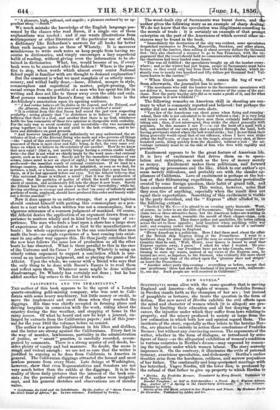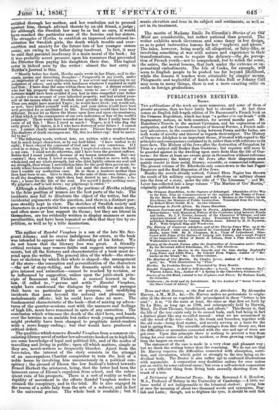NEW NOVELS.*
SCANDINAVIA seems alive with the same question that is moving England and. America—the rights of women. Fredrika Bremer in Sweden 'stands forth as the- champion of her sex ; but instead of pamphlets or lectures, she treats the question in the form of fiction. Her new novel of Hertha exhibits the evil effects upon. the mind and character 'of women which (it is alleged) are pro- duced by limiting their education and all but denying them a career, the injustice under which they suffer from laws relating to property, and the misery produced to society at large from the low estimation in which both law and opinion regard them. The incidents of the story, especially as they relate to the heroine Her- tha, are planned to embody in action these conclusions of Fredrika Bremer ; but without any convincing success. The arguments of the writer, whether in the form of dialogue, or introduced by some figure of fancy—as the allegorical exhibition of women's condition in various countries in Bertha's dream—may expound by reason- ing the injustice under which women labour. The story scarcely impresses it. On the contrary, it illustrates the evils of paternal tyranny, avaricious speculation, and dishonestv. Hertha's earlier troubles arise from the harshness, coldness, and narrow prejudices of her father. The continually and long-postponed marriage with her betrothed, Yngve Nordin, till the lover dies, is produced by the refusal of that father to give up property to which Bertha is • Hertha. By Fredrika Bremer. Translated by Mary llowitt. Published by Hall, Virtue, and Co. Randal Vaughan: or Self in Self-Sacrifice ; a Norel. By a Warren Adams, Esq., Author of "A Spring in the Canterbury Settlement.' In two volumes. Published by Newby.
Stories of an Old Maid, related to her Nephews and Nieces. By Madame Emile
De Girerdin. Published by Addcy and Co. entitled through her mother, and. her resolution not to proceed against him, though advised thereto by an old friend,, a judge ; for although the Swedish law may be as bad as ours, it would have reached the particular case of the heroine and her sisters. The struggles of Hertha to establish an improved educational in- stitution for Swedish girls, the death which trouble and over- exertion and anxiety for the future fate of her younger sisters cause, are owing to her father dying insolvent. In fact, it may be said that parental insolvency is a main moral of the book ; for it was probably secret pressure upon his resources that prevented. the Director from paying his daughters their due. This logical error is indeed. seen by the writer : almost the last entry in Hcrtha s journal is " Shortly before her death, Herdic,. again wrote in. her Diary, as if to dis- sipste uneasy and disturbing thoughts—' Frequently in my youth, under an impression of my own righteousness, I was severe and unsparing in my judgment of others, and spoke with harshness whatever I regarded as right and true. I have done the same within these last days. A distant relative, who lost his property through my father, wrote to me—" All your mis- fortunes might have been avoided if you had in time compelled your father to render you an account of your inherited property, and had availed your- self of the means which our Swedish laws provide to obtain your liberty. Then you might have married Yn,gve; he would have lived ; you would not, as now have killed yourself with work, and your sisters would have been well provided for or established in life. Everything would then have been different. Do not let is throw the blame npon laws and upon circumstances, of!that which is the consequence of our own indecision or fear of the world's judgment.' These words have wounded me deeply. Have I really been the cause of all this ? Have I erred so much ? Yngve, is it I who dug thy early grave ? My sisters, is it I who have destroyed your future ? I cannot see. I cannot clearly understand things now. Disease has weakened me. The shadows of death encompass me. Oh, this is a bitter cup ! God be merci- ful to me ! '
" The following words, without date, are written with a steadier hand, but in much larger characters, as by one half-blind. 'I have wished to do right; I have obeyed the command of God and my own conscience. If I erred in so doing, if in fulfilling one duty I neglected others, then the fault is my own. I could not do -otherwise, and I have been the greatest sufferer. Before God I stand justified, because of my honest intentions. But—my country ! thou whom I loved so much, whom I wished to serve with my whole soul and my whole strength, but who didst lightly esteem my soul and my strength, thou whom I nevertheless bless for the good thou gayest me, to- wards whose honourable future I still look amid the shadows of death ; to thee I confide my motherless ones. Be to them a tenderer mother than thou haat been to me. Give to them, for the sake of thine own future, give to all thy daughters, that which thou hest denied to me ; freedom ; a fu- ture a home for the life of the soul. For myself I desire nothing more. My pilgrim's staff is laid dawn ; my pilgrimage is ended.' " Although a didactic failure, yet the portions of Hertha relating to the false position of women are the best parts of the tale. The incidents- may fail to illustrate the object of the writer, but the incidental arguments stir the question, and there is a distinct pur- pose steadily kept in view. The sketches of Swedish society and characters in a provincial town are connected with the main story, and often more or less support its theme ; but they are literal in themselves, are too evidently written to display manners or mere peculiarities, and have been repeated so often that they tire by re-
petition, as well as by a trite mannerism. •
The author of _Randal Vaughan is a son of the late Mr. Ser- geant Adams ; and he craves indulgence for errors, as the book was intended to appear under the editorship of his father. We do not know that the literary loss was great. A friendly critical revision may remove faults and suggest minor improve- ments, but all the features and characteristics of a book must de- pend upon the writer. The general idea of the whole—the struc- ture or skeleton by which this whole is shaped—the management of the story—the conception and personification of the characters —the art of story-telling, and the dramatic spirit which is to give interest and animation—cannot be reached. by revision, or be influenced by suggestion, unless upon the joint-stock prin- ciple of Beaumont and Fletcher. A counsel learned in the law, if called to, " peruse and settle " Randal Vaughan, might have condensed the dialogue by striking out passages that have no particular point or purpose, and modifying incidents that pass beyond the natural and pleasing into melodramatic effects ; but he could have done no more. The fundamental characteristic of the book—that of mixing up adven- tures of the quarter-sessions cast with the manners and feelings of high life, must have remained in spite of any correction. The conclusion which witnesses the death of the chief hero, and hands over the heroine to an amiable but rather weak young gentleman, • mht probably have been changed to propitiate novel-readers a more happy ending ; but that would have produced a critical defect.
The qualities which remove Randal Vaughan from a common cir- culating library novel of rather low adventure hooked on to high life, are some knowledge of legal and political life, and of the modes of travelling and living in public ; upon all which matters, simple as they are, novel-writers so frequently blunder. Apart from the love-tales, the interest of the story consists in the attempt of an unscrupulous Chartist conspirator to ruin the heir of a noble house by involving him unconsciously in a political con- epiracy ; the ground of Eleson the low Radical's hatred towards Ernest Herbert.the aristocrat, being, that the latter had been the innocent cause of Eleson's expulsion from school, and the subse- quent ruin of his prospects. There is a sort of reality as well as rapidity of movement in the efforts Randal Vaughan makes to unmask the conspiracy, and in the trial. He is also engaged in the rescue of a noble lady from the arts of a seducer, and in fact is the universal genius. The whole book is readable ; but it
wants elevation and tone in its subject and sentiments, as well as art in its treatment.
The merits .of Madame Emile De Girardin's Stories of an Old Maid age considerable, but rather national than f;eneral. The writer exhibits much cleverness and some fancy in her design,. so as to point instructive lemons for her "nephews and nieces." The tales, however being nearly all allegorical, .or fairy-like, or involving something at war with nature-and experience in their transformations, seem to require the delicaoy—the fin percep- tion- of French youth—not to comprehend,,but to relish the sense,- , the satire, the moral lessons, that lurk under the -extreme or au- - pernatnral embodiments. The Isle of Cooks, for example, Will seem to English people to be pushed too far beyond likelihood, while the lessons it teaches were attainable by simpler means. Phlegmatic and neglectful of finish as John Bull or johnny Calf , may seem in many things, there is not a more exacting critic on earth in foreign productaons.



























 Previous page
Previous page